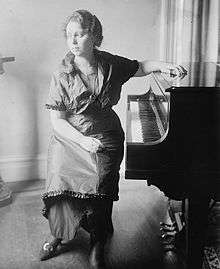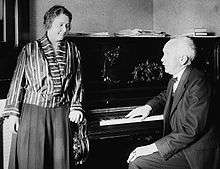Elisabeth Schumann
Elisabeth Schumann (13 June 1888 – 23 April 1952) was a German soprano who sang in opera, operetta, oratorio, and lieder. She left a substantial legacy of recordings.

Career
Born in Merseburg, Schumann trained for a singing career in Berlin and Dresden. She made her stage debut in Hamburg in 1909. Her initial career started in the lighter soubrette roles that expanded into mostly lyrical roles, some coloratura roles, and even a few dramatic roles. She remained at the Hamburg State Opera until 1919, also singing during the 1914/1915 season at the Metropolitan Opera, New York.

From 1919 until 1938, she was a star of the Vienna State Opera. Her most famous role was that of Sophie in Richard Strauss's Der Rosenkavalier, but she also excelled in Mozart, taking the roles of Pamina in Die Zauberflöte, Zerlina in Don Giovanni, Blonde in Die Entführung aus dem Serail and Susanna in Le nozze di Figaro.
The conductor Karl Alwin was her second husband from 1920 until 1938. In 1938, she emigrated to New York City where she lived until her death on 23 April 1952, aged 64. During World War II she gave recitals but mainly taught singing, privately and at the Curtis Institute of Music in Philadelphia. After the war she gave many recitals in Europe, making a particularly successful comeback in England.
She was a much-loved artist, admired for her vivacity, elegance, and beauty. She was closely connected with Richard Strauss, Otto Klemperer, Lotte Lehmann, Bruno Walter, Wilhelm Furtwängler, and other leading musicians of the first half of the 20th century.
Honors
- Honorary Member of the Vienna State Opera and the first female Honorary Member of the Vienna Philharmonic.[1]
Opera roles
In a career spanning 28 years, Schumann sang 91 roles. Her debut role was the Shepherd Boy in Tannhäuser on 2 September 1909 in Hamburg; on 1 November 1937 her last role was the First Flower maiden in Parsifal in Vienna.[2]
|
|
Biography
- Elisabeth Schumann: a Biography by (her son) Gerd Puritz, edited and translated by her granddaughter, Joy Puritz, published 1993 by André Deutsch, London, ISBN 0-233-98794-0 (out of print); revised paperback edition published 1996 by Grant and Cutler, London, ISBN 9780729303941
Recordings
- Great Voices of the Century sing Exotica, SCSH 005[3]
- "Elisabeth Schumann: Silver thread of song", EMI Classics, 2011, digitally-remastered 6-CD set, 5099991848024.
References
- Elisabeth Schumann at Naxos Records, retrieved on December 3, 2007.
- "The Opera Roles of Elisabeth Schumann" Archived 2008-12-21 at the Wayback Machine, ElisabethSchumann.org, accessed 23 October 2008
- Great Voices of the Century sing Exotica SanCtuS Recordings
External links

- Elisabeth Schumann website, discography, photographs (2003)